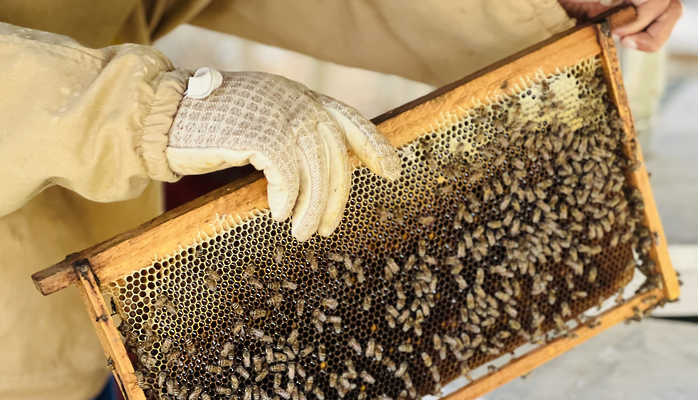Samar honey production in the Wilayat of Mahdha in Al Buraimi Governorate has exceeded 5 tonnes for the year 2024. The region is home to 45 beekeepers with a total of 2,985 beehives, making honey beekeeping a significant source of income for many families in the area. The profession also plays a vital role in supporting the national economy by meeting the local market’s demand for Omani honey and exporting surplus produce outside the Sultanate of Oman. Despite facing challenges such as delays in honey harvesting due to heavy rainfall affecting vegetation cover, beekeepers in Al Buraimi Governorate continue to thrive.
Engineer Mohammed bin Salem bin Obaid Al Kaabi, Director of Agriculture and Water Resources in the Wilayat of Mahdha, highlighted the importance of honey beekeeping as an ancient Omani profession. He explained that there are two types of honey bees in the region – the “Abu Twaiq,” which lives in mountain caves and is known for its high quality but limited production, and the “Mustanas” bees, which are raised using modern methods in wooden hives. The Mustanas bees are highly productive, resistant to pests and diseases, efficient in collecting nectar and pollen, and adaptable to various weather conditions. The Department of Agriculture and Water Resources in Mahdha provides essential support to beekeepers, including technical assistance, tools, and educational programs to promote healthy beekeeping practices.
In recent years, the Wilayats of Al Buraimi Governorate have experienced adverse weather conditions, including heavy rainfall impacting vegetation cover and consequently delaying honey harvesting. Despite these challenges, the beekeepers in the region remain dedicated to their craft, ensuring the production of high-quality Samar honey. The sustainable practices of beekeeping in Al Buraimi Governorate not only meet the local market’s demand for Omani honey but also contribute to the export industry, generating revenue for the beekeepers and supporting the national economy.
Al Kaabi emphasized the Department of Agriculture and Water Resources’ commitment to providing comprehensive support to beekeepers in Mahdha. This includes technical assistance, tools, and resources necessary for the successful raising and propagation of bees. Additionally, the department conducts various awareness programs, seminars, and lectures to educate beekeepers on best practices for Omani beekeeping. Guidebooks are also published to introduce healthy beekeeping methods and promote sustainable practices within the community.
The honey beekeeping industry in Al Buraimi Governorate continues to thrive, with beekeepers benefiting from the region’s rich natural resources and conducive environment for beekeeping. The production of Samar honey not only provides a source of income for local families but also plays a crucial role in supporting the economy of the Sultanate of Oman. The Department of Agriculture and Water Resources in Mahdha plays a vital role in empowering beekeepers through technical support, educational programs, and resources to ensure the sustainability and growth of the honey beekeeping industry in the region. With their dedication and commitment to excellence, beekeepers in Al Buraimi Governorate are contributing to the preservation of Omani traditions and the promotion of healthy, sustainable beekeeping practices.










